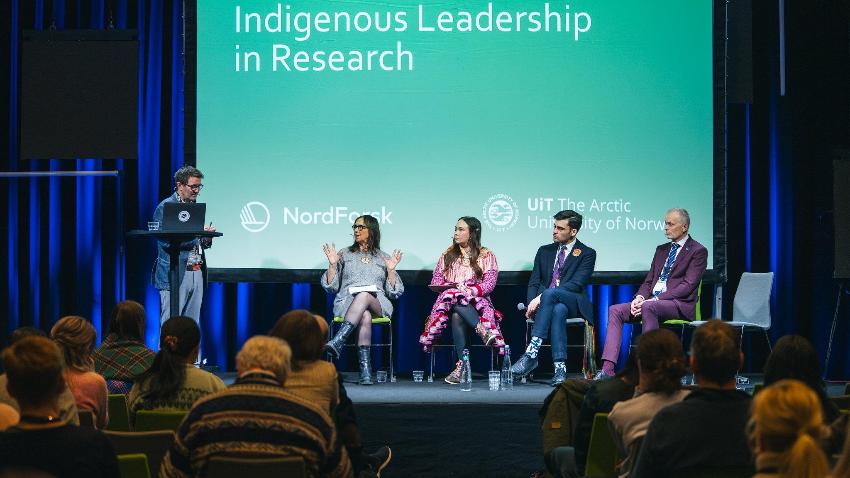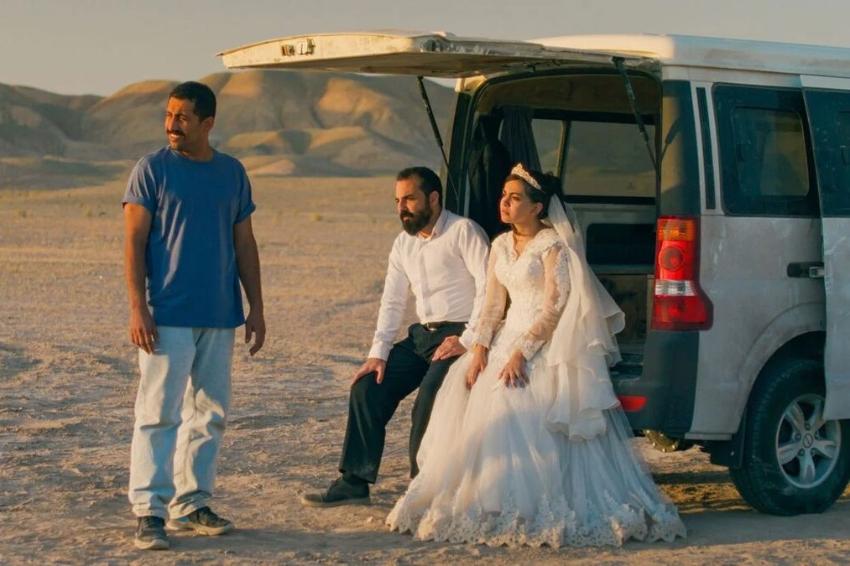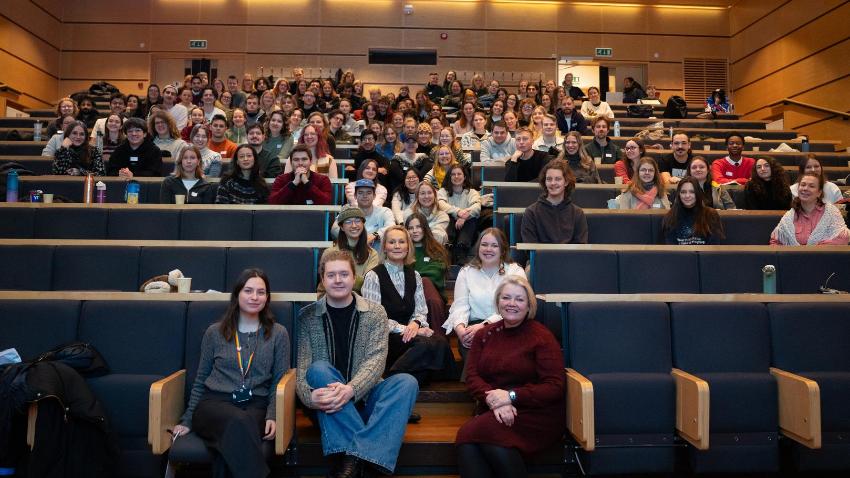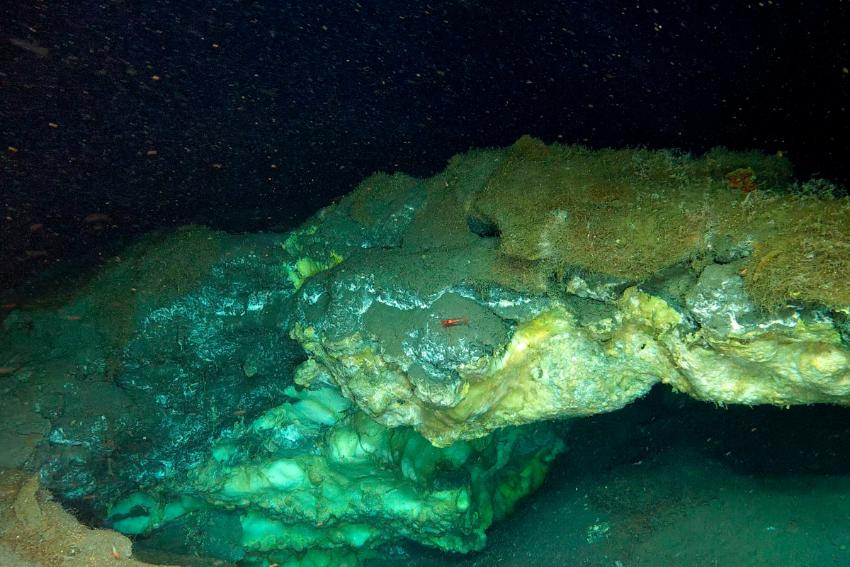Democratisation of knowledge building
At UiT in Tromsø, in April, academics and students with an international background met with participants from other parts of society to exchange ideas and experiences. Together, they discovered innovative solutions for research in social work and child welfare, education, health nursing, and occupational therapy.

The research centre Arctic Youth, in collaboration with the EUGLOH university alliance, hosted a co-creation week and workshop at the Faculty of Health Sciences at UiT from 7–11 April.
The workshop was titled “Collaborative research, education and practice promoting wellbeing and growth.”
Researchers, PhD candidates, and students from nine European partner universities within the EUGLOH alliance participated. They engaged with representatives from various sectors of society to discuss and develop new solutions for conducting research as interdisciplinary teamwork, also referred to as “collaborative research.”
The Arctic Youth Research Centre aims to strengthen educational programmes targeting children and young people in need of support or follow-up from various professions, particularly in the Arctic region.
During the workshops, participants were presented with challenges rooted in critical thinking and ethical perspectives on research, education, and practice within social welfare, schooling, Indigenous perspectives, and public health.

Collaborative research
The workshop programme is based on the methodology of Participatory and Appreciative Action Research (PAAR). A cornerstone of this research method is that individuals or community stakeholders can become partners in the processes of designing, conducting, and disseminating research. This approach can help drive social change or service development.
"This type of research is widespread in Europe, whereas in Norway it has only gained a foothold in recent years. Together with colleagues, I have worked for many years on collaborative research, particularly in the fields of mental health and substance use. Now, many of us see the need to expand this methodology to other disciplines," says Rita Sørly, head of Arctic Youth and professor of social work at UiT.
Collaborative research can be led and conducted by researchers in partnership with students, members of community groups and organisations, businesses, or public sector actors.
Stakeholders from diverse backgrounds can become involved in research in various ways: from providing data to designing projects, planning research, or participating in data collection and analysis. They can also contribute to producing findings or results and disseminating those findings.
Open, collaborative research can enhance the quality of research and lead to democratisation and service development when research and knowledge become accessible across disciplines, sectors, and countries,.
In this research method, the aim is also to move away from a perspective where stakeholders are seen as lacking or deficient in resources, and instead to identify the resources they can build upon to improve their own living conditions.

"PAAR can be placed under the umbrella of citizen science. This type of open, collaborative research can enhance the quality of research and lead to democratisation and service development when research and knowledge become accessible across disciplines, sectors, and countries," Sørly points out.
Opening up opportunities for new projects
Sørly highlights that PAAR research is also a priority focus area for the Research Council of Norway and has been emphasised in the government’s long-term plan for research (LTP).
Facts about the Co-Creation Week
- Brought together participants from nine European universities with backgrounds in health and welfare disciplines.
- The event was titled “Collaborative research, education and practice promoting wellbeing and growth.”
- The Arctic Youth Research Centre organised the workshop during the Co-Creation Week, focusing on collaboration in research, education, and practice.
- Participants in the workshop were challenged to develop new interdisciplinary methods and approaches to research on inclusion and social participation for vulnerable community groups.
- The workshops were based on the theoretical perspective of Participatory and Appreciative Action Research (PAAR), also known as collaborative research.
- This methodology allows research to be led and conducted by researchers in collaboration with students, members of community groups and organisations, businesses, or public sector actors.
"Citizen science is highlighted as an important factor for broader public involvement. This way of conducting research is becoming increasingly widespread, both here at home and internationally. Researchers affiliated with Arctic Youth certainly see the potential for using this methodology in work related to the processes following the Truth and Reconciliation Commission," says Sørly.
According to her, the co-creation week largely focused on how academic communities at EUGLOH universities can expand their professional networks beyond academia by making researchers more accessible for dialogue and input from other parts of society.
"At Arctic Youth, we emphasise active learning methods, where participants themselves develop and present solutions to various practical challenges. We believe that this way of working opens up many new interdisciplinary projects in collaboration with stakeholders outside academia. It is also rewarding to note that this type of research can sometimes lead to real change," Sørly states.
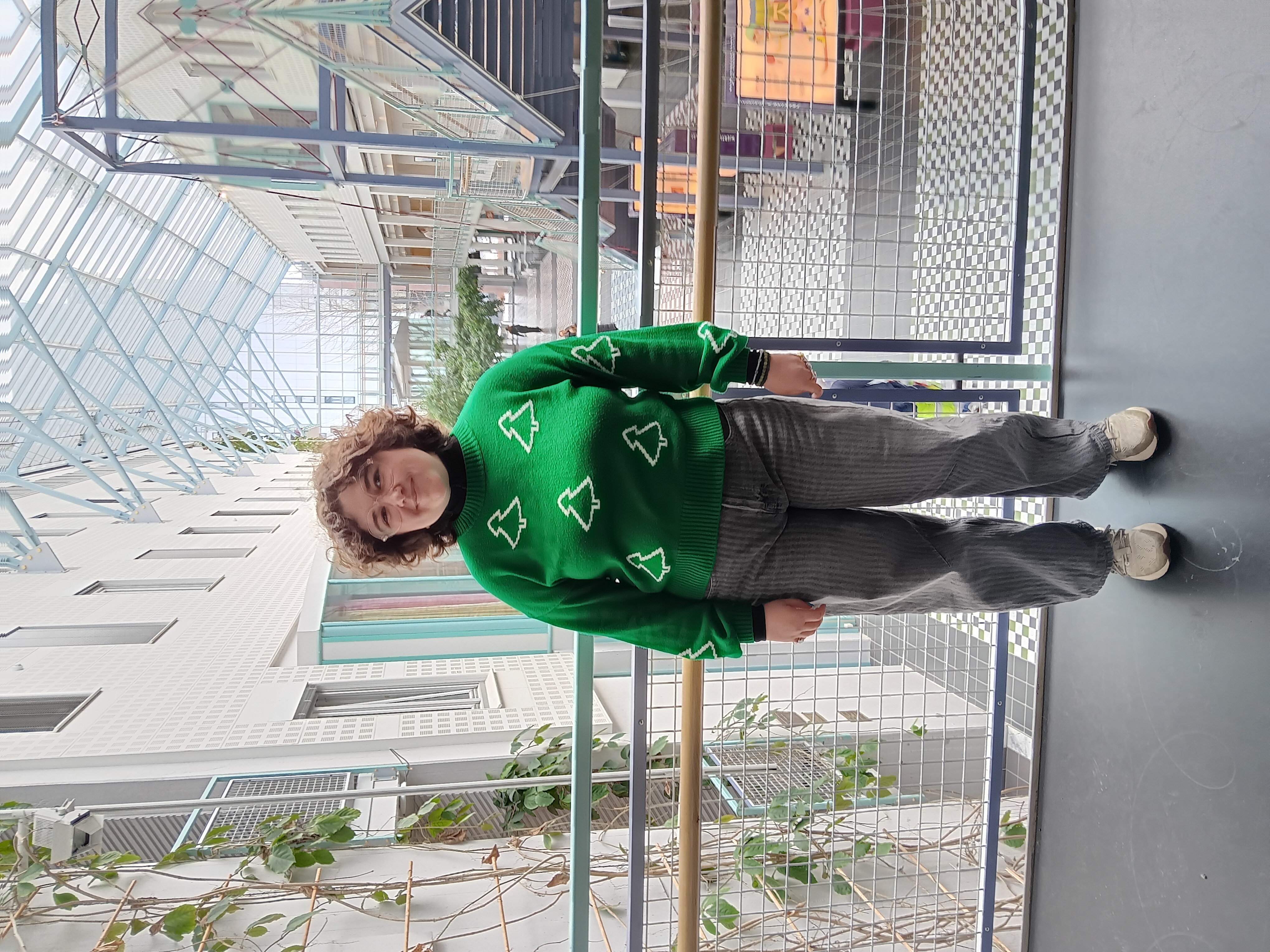
Cultural sharing and new digital tools
How social exclusion, caused by discrimination and prejudice, can affect daily life and quality of life was a key theme during the Co-Creation Week. One of the workshops focused on how to facilitate collaborative research, education, and practice that not only includes but also promotes the perspectives of Indigenous peoples and other vulnerable groups.
We interviewed two participants from this workshop about their experiences working on such issues during the Co-Creation Week.
Colyne Rambicur, from France, is a master’s student studying Applied Cultural Analysis at Lund University.
Her main motivation for participating in the workshop was to deepen her understanding of Sámi culture and the impact cultural contexts can have on Sámi youth.
"I am writing my master’s thesis on Sámi representation in museums, and I wanted to expand my understanding of other forms of cultural history representation. This workshop is the perfect way to do that," says Rambicur.
She also noted that during the Co-Creation Week, she greatly benefited from learning how digital tools can be utilised in research on health and welfare.
Colyne Rambicur, master’s student studying Applied Cultural Analysis at Lund University
"These are tools that I haven’t had much experience with or dared to use until now. But I now understand that it’s possible to work with such tools, and it’s also great to collaborate with others. In an online context, one can operate anonymously, which makes it easier to get responses."
We all have different cultural or academic backgrounds. It’s important to bring that with us and blend our cultures. This provides a solid foundation for contributing diverse perspectives and solutions to the challenges we face.
For Rambicur, it has been a significant advantage to meet colleagues from several European countries and work together on interdisciplinary issues.
"We all have different cultural or academic backgrounds. It’s important to bring that with us and blend our cultures. This provides a solid foundation for contributing diverse perspectives and solutions to the challenges we face. It’s crucial to foster understanding across cultures."
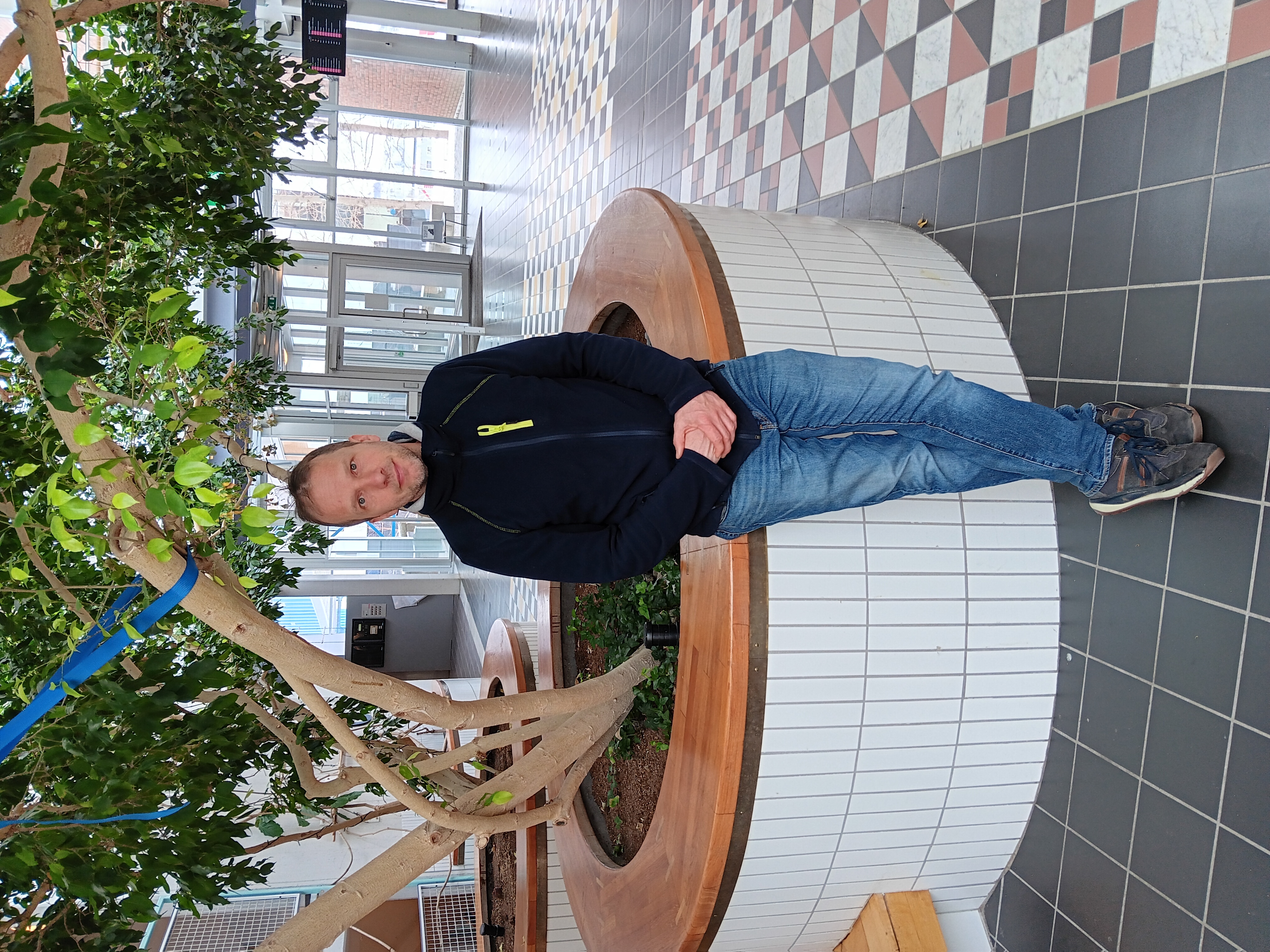
Researching vulnerable groups
Gyorgy Malovics is a professor of ecological economics at the University of Szeged and a member of the EUGLOH secretariat at the university, responsible for the institution’s community engagement.
Malovics and his colleagues work with Roma families who have lived segregated from the rest of society, in their own areas or neighbourhoods. They employ collaborative research to explore ways to improve their welfare and living conditions.
"We work with vulnerable communities in Szeged, including Roma people and other marginalised groups, such as the LGBTQ+ community. These are individuals living with mental health challenges and in poor conditions. Unfortunately, they are heavily stigmatised and are a minority in the Hungarian context. Sadly, they are also stigmatised by the Hungarian state itself," says Malovics.
During the Co-Creation Week, he discovered new perspectives and methods that could be useful in his future work upon returning to Hungary.
"What’s interesting for me is how these concepts are put into practice. The experiences I’ve had in Tromsø are highly relevant to my work in Hungary. The examples we were presented with regarding the Sámi people were largely new to me. Sámi people also suffer from stigmatisation in the Norwegian context. Their situation shares several similarities with that of the Hungarian Roma population."
Conventional research, and even social research, often does not focus on collaboration and social impact. We are the 'odd ones' working on the margins of academia.

Motivating collaboration
Like Rambicur, he believes that meeting colleagues from other European countries during the Co-Creation Week has been a positive experience.
"For me, it is always encouraging and empowering to meet others working with collaborative research, because these approaches, unfortunately, exist on the fringes of academia. Conventional research, and even social research, often does not focus on collaboration and social impact. We are the 'odd ones' working on the margins of academia. That’s why it’s so important to participate in such networks. We can learn from each other, but what’s most important to me is that we are aware of each other and can support one another if needed," he points out.
Sørly believes that the participants from EUGLOH contributed valuable international perspectives on shared challenges.
"I would say that all the groups presented innovative, forward-thinking, and collaborative initiatives that could lead to change. The groups themselves expressed enthusiasm, and everyone was eager to continue the collaboration they had started here in Tromsø. At Arctic Youth, we now see the seeds of several new collaborative projects with participants from the workshops. We are very pleased about that," Sørly concludes.
-
Hørelæredidaktikk - master
Varighet: 2 År -
Praktisk-pedagogisk utdanning i musikk - årsstudium
Varighet: 1 År -
Public Health - master
Varighet: 2 År -
Medisin profesjonsstudium
Varighet: 6 År -
Nordisk - årsstudium
Varighet: 1 År -
Pedagogikk - bachelor
Varighet: 3 År -
Bioingeniørfag - bachelor
Varighet: 3 År -
Spesialpedagogikk - master
Varighet: 2 År -
Pedagogikk - master
Varighet: 2 År -
Informatikk, sivilingeniør - master
Varighet: 5 År -
Likestilling og kjønn - årsstudium
Varighet: 1 År -
Biomedisin - bachelor
Varighet: 3 År -
Psykologi - bachelor
Varighet: 3 År -
Logopedi - master
Varighet: 4 År -
Ergoterapi - bachelor
Varighet: 3 År -
Fysioterapi - bachelor
Varighet: 3 År -
Radiografi - bachelor
Varighet: 3 År -
Grunnskolelærerutdanning for 1.-7. trinn - master
Varighet: 5 År -
Grunnskolelærerutdanning for 5.-10. trinn - master
Varighet: 5 År -
Samfunnssikkerhet - master
Varighet: 2 År -
Farmasi - bachelor
Varighet: 3 År -
Farmasi - master
Varighet: 2 År -
Psykologi - årsstudium
Varighet: 1 År -
Odontologi - master
Varighet: 5 År -
Tannpleie - bachelor
Varighet: 3 År -
Filosofi - bachelor
Varighet: 3 År -
Barnehagelærer - bachelor
Varighet: 3 År -
Barnehagelærer - bachelor
Varighet: 3 År -
Sykepleie - master
Varighet: 2 År -
Barnevern - bachelor
Varighet: 3 År -
Barnehagelærer - bachelor
Varighet: 3 År -
Sosialt arbeid - bachelor
Varighet: 3 År -
Idrettsvitenskap - master
Varighet: 2 År -
Grunnskolelærerutdanning for 1.-7. trinn - master
Varighet: 5 År -
Praktisk-pedagogisk utdanning for yrkesfaglærere - årsstudium
Varighet: 2 År -
Sosialt arbeid - master
Varighet: 2 År -
Praktisk-pedagogisk utdanning for trinn 8-13 - årsstudium
Varighet: 2 År -
Vernepleie - bachelor
Varighet: 3 År -
Barnevern - bachelor
Varighet: 3 År -
Vernepleie - bachelor
Varighet: 4 År -
Ernæring - bachelor
Varighet: 3 År -
Videreutdanning i krisehåndtering og traumebehandling
Varighet: 1 År -
Videreutdanning om vold i nære relasjoner
Varighet: 1 År -
Videreutdanning i rus og psykisk helse
Varighet: 1 År -
Spesialpedagogikk - bachelor
Varighet: 3 År -
Paramedisin - bachelor
Varighet: 3 År -
Grunnskolelærerutdanning for 5.-10. trinn - master
Varighet: 5 År -
Nordisk språk og litteratur - bachelor
Varighet: 3 År -
Fysioterapi - master
Varighet: 3 År -
Aldring og geriatrisk helsearbeid - master
Varighet: 3 År
